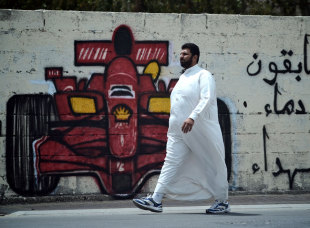
- News:
-
FOTA relying on FIA for Bahrain decision
- News:
-
We cannot force teams to go to Bahrain - Ecclestone
- Race:
- Bahrain Grand Prix
The will they, won't they, should they, shouldn't they debate over whether the Bahrain Grand Prix ought to go ahead in a fortnight is Formula One's own Groundhog Day - only in this instance it's all about commercialism and not comedy.
The stories circulating in the last few days of unrest within teams and increasing political pressure to scrap the event are almost identical to those a year ago. Protests, often violent, inside Bahrain against the autocratic royal family escalate while the world of F1 pretends all is well.
There has been a well-orchestrated government-funded campaign over the last year by the Bahrain authorities to persuade and charm the world's media and those high up the F1 food chain to hold the 2012 grand prix. Until very recently that appeared to have worked.
It is often said sport and politics should not mix. But this is an example of where politicians openly use sport to push their own agendas, so the entanglement is already there. Bahrain is unlike races in other countries with, arguably, governments with equally poor records of human rights. If, say, the Chinese Grand Prix were to be scrapped in a fit of F1 morality it would make not a scrap of difference politically to anything or anyone.
But in Bahrain the grand prix is of huge significance. It was never anything but a massive advertisement for the kingdom, but since the unrest started in 2011 it taking place has become crucial for the government in showing the world all was well. That is why every effort has been made and millions of dollars spent on trying to convince as many people as possible the race should proceed.
There has also been a concerted lower-profile campaign from within Bahrain. ESPN has received a large number of eloquent emails from within the country assuring us media reports are inaccurate and peace and harmony is the order of the day. After a while the similarities between the messages becomes all too familiar.
The role of Bernie Ecclestone has been to steadfastly support the Bahrain organisers. There is nothing wrong with that and he has commercial partners and commitments to protect. But too often he seems to have crossed the line between businessman and unofficial spokesman for the authorities. Ecclestone and the FIA - especially its president Jean Todt - need to make very clear as to their close associations to leading figures in Bahrain before making statements about the situation inside the kingdom.
Sadly, anyone who expects Formula One and the FIA to make a stand on their own is woefully misguided. These are, after all, organisations which continued to race in sanction-hit South Africa years after almost every other team sport had turned their backs on the apartheid regime. And when they finally called time after the 1985 race at Kyalami it was not because of any growing conscience, it was because sponsors covered up logos on cars for fear of being tarnished by being seen to be racing there.
It will again be commercial issues which decide the fate of the 2012 Bahrain Grand Prix. If sponsors decide promoting their brands against a backdrop of civil unrest, if insurers decide it is too expensive to cover the multi-million dollar F1 roadshow, or if political pressure becomes too vociferous, then it will be scrapped.
If it's a moral lead people want, however, then the world of F1 is not the place to look.
Martin Williamson is managing editor of digital media ESPN EMEA
© ESPN Sports Media Ltd.
 Martin Williamson is managing editor of digital media ESPN EMEA Martin Williamson, who grew up in the era of James Hunt, Niki Lauda and sideburns, became managing editor of ESPN EMEA Digital Group in 2007 after spells with Sky Sports, Sportal and Cricinfo
Martin Williamson is managing editor of digital media ESPN EMEA Martin Williamson, who grew up in the era of James Hunt, Niki Lauda and sideburns, became managing editor of ESPN EMEA Digital Group in 2007 after spells with Sky Sports, Sportal and Cricinfo

